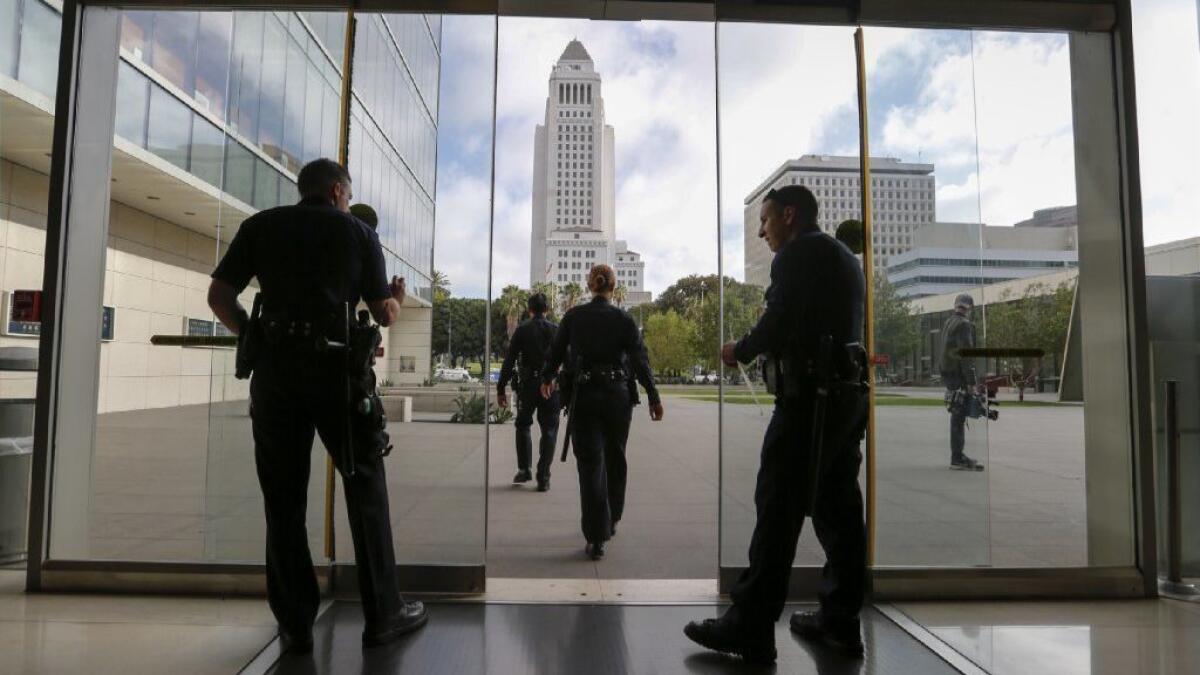Editorial: California needs to shine a light on police misconduct

- Share via
Public disclosure of police misconduct is a basic element of oversight and is the law in most states. But not in California, as shown by a chilling Times series describing the injustices — including wrongful convictions — that result from a number of laws and court rulings that mask police officer conduct under an impenetrable cloak of secrecy.
The first part of the series picks up the story of Los Angeles County Sheriff’s Deputy Jose Ovalle, who was disciplined early in his career for falsifying evidence — dabbing taco sauce on a shirt, taking a picture of it and claiming it showed blood from a jailhouse brawl. The Times first reported about Ovalle in December. For years, the district attorney’s office was unaware that he had such a history, so prosecutors could not weigh his credibility when filing charges based on his reports. And just as important, they could not inform defendants of the existence of evidence that could be used to question the reliability of an important witness against them, as is required under the Constitution.
It turns out that there were 312 cases in which Ovalle was a potential witness, as reported in The Times’ report on Aug. 9. Defendants were convicted in 237 of them. The deputy actually took the stand in 31 cases. But in only a handful did defendants learn that there was evidence they could use to impeach Ovalle’s credibility.
That’s in part because it’s so difficult for defense lawyers to find out. Prosecutors must inform defendants of any relevant information, but the same privacy laws that keep police records from the public keep them from prosecutors as well. The “Pitchess” process that requires police agencies to bring personnel records to court for a judge to review, in order to decide whether to disclose them to the defense, is unduly burdensome. To request the review, defense lawyers must show a reasonable suspicion that there is evidence of dishonesty or misconduct in an officer’s file. And even then, the process only works when the police acknowledge that there is relevant evidence to turn over.
No other state shields officer information as thoroughly as California.
That weakness is outlined in a Times story published online on Aug. 14 about an officer who resigned amid an investigation into whether he had falsified reports and used excessive force. A Contra Costa County court ordered the Pittsburg Police Department to bring in the officer’s files, but a report on the investigation was for some reason omitted.
And even if such files are indeed produced in court and even if they help acquit the defendant, the cost is high — as shown by an online interactive Times feature that outlines the pluses and minuses for the defense of pursuing the information. Even defendants who are falsely accused have an incentive to plead guilty, because of the time it takes to get the records and then use them to track down a reliable witness to the officer’s wrongdoing — one who is willing to testify at trial. Pursuing justice can mean months in jail before trial. Pleading guilty can mean quick release. The deck is stacked against the accused. The law favors officers, even those with records of lying.
Federal rules are less weighted toward officers. But as described in a Times story of Aug. 10, even officers whose testimony is deemed worthless in federal court because their files lay out a history of dishonesty can continue to testify in state court, where their misdeeds go undisclosed.
Enter the Fray: First takes on the news of the minute from L.A. Times Opinion »
No other state shields officer information as thoroughly as California. This politically liberal state allows strong government employee unions — and police unions here have used their clout to win enormous legal protection.
The earliest protections seemed reasonable enough. The point of the Public Safety Officer’s Procedural Bill of Rights, signed into law by new Gov. Jerry Brown in 1976, was to protect honest officers from unfair interrogations and investigations by unscrupulous supervisors. It was backed by the American Civil Liberties Union.
But Brown later signed bills that put officer records increasingly out of reach, and court interpretations solidified a wall of secrecy.
The state Supreme Court will soon consider whether state law allows Sheriff Jim McDonnell to turn over evidence of deputy misconduct to prosecutors, a step he considers imperative for reform. But the public would still be aced out, which means it would still be impossible to learn which officers account for disproportionate injuries and public liability, and which agencies operate effective internal investigations. That means little actual public oversight of law enforcement agencies in California.
A key hearing is set this week for a bill, SB1421, that would lift, ever so slightly, the veil that protects police records of officers falsifying evidence, lying, discharging firearms, using certain types of force and engaging in sexual assault. It is exceedingly modest. The information would be available only under the Public Records Act process. But it would be an important step toward an appropriate level of police oversight in California. Lawmakers should pass the bill and send it to Brown — and give him a chance to partially rectify one of the 1970s excesses that gave police in California such unusual and unwarranted privilege.
Follow the Opinion section on Twitter @latimesopinion and Facebook
More to Read
A cure for the common opinion
Get thought-provoking perspectives with our weekly newsletter.
You may occasionally receive promotional content from the Los Angeles Times.









